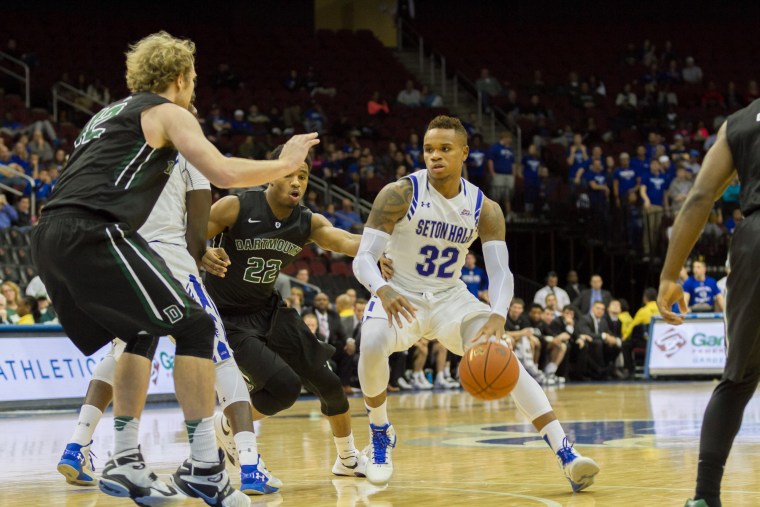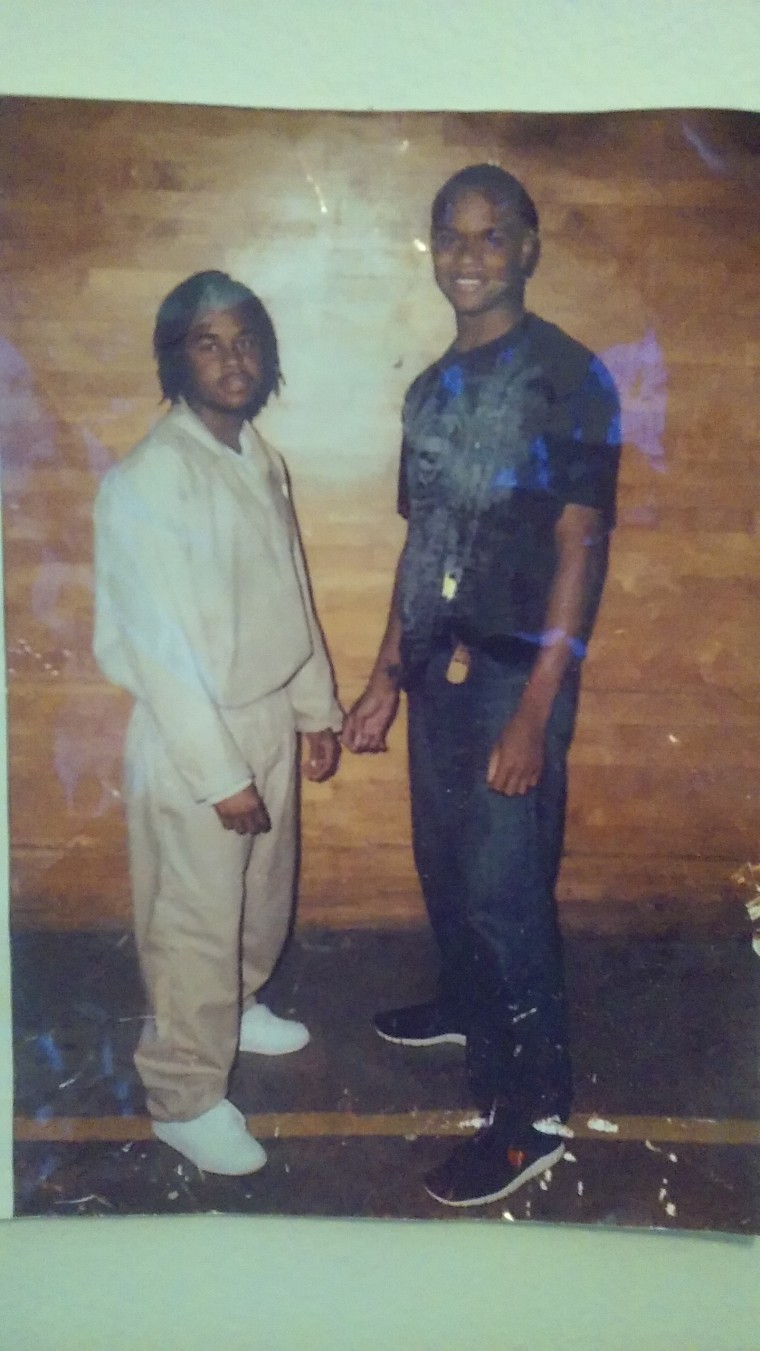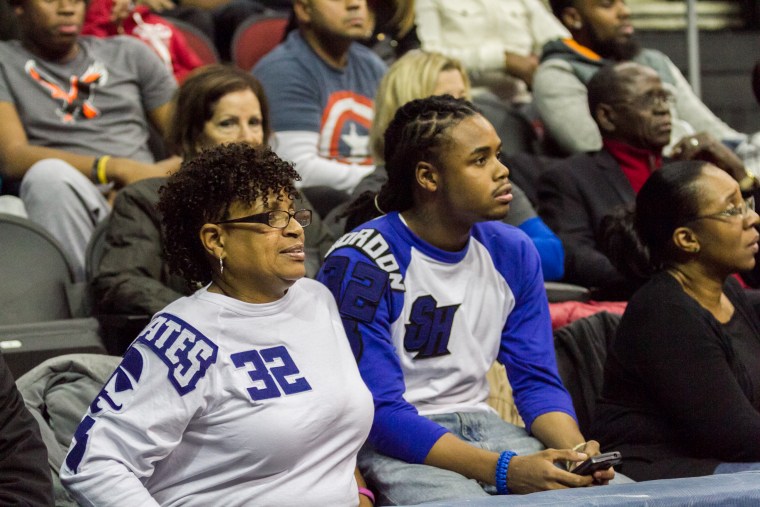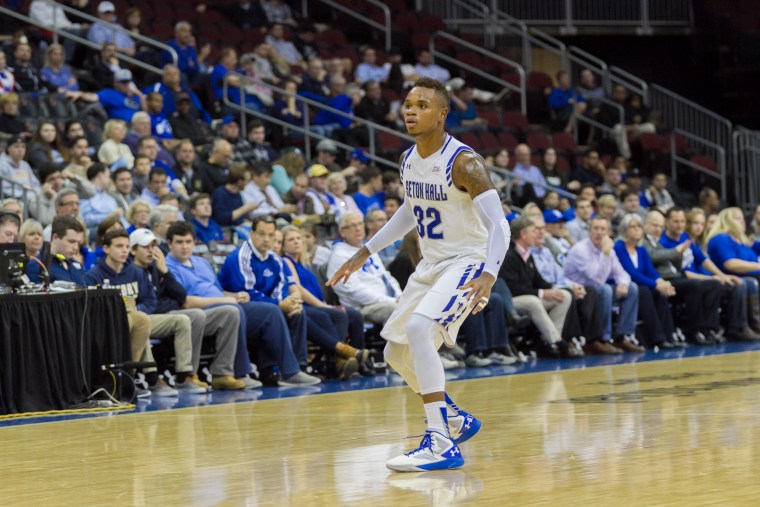Ten minutes and 47 seconds have gone by in the first half of Seton Hall’s season opener on Nov. 13 and Derrick Gordon is about to check in for the second time. As he rises from the bench to make his way towards the scorer’s table, he sees a familiar face get up in the stands.
The face is very similar to his own, but Darryl Gordon’s dreadlocks and smaller stature make for distinct differences between the fraternal twins. With Derrick in the middle of his Seton Hall debut, the two lock eyes.
“It’s go time,” Darryl tells his brother from a row behind the team’s bench.
One minute and 45 seconds later, Gordon knocks down a shot from behind the arc, his first field goal as a Pirate. In response, Darryl throws both of his arms straight into the air. Their mother, Sandra, is jumping up and down next to him as she screams, “Go Derrick!” The Hall leads Dartmouth 18-17.
“Seeing us here at games is definitely going to push (Derrick),” Darryl said of his family’s presence.
Family is one of the reasons Derrick chose Seton Hall when he decided to transfer from the University of Massachusetts. A native of Plainfield, N.J. – just 19 miles from the Prudential Center – the graduate transfer from UMass can now expect his family at most of his games.
“It’s beautiful because now we can come to all the games – at least the home ones,” Sandra said. “I think by us being here it kind of helps him focus on shooting that ball more and playing his game.”
Derrick admits that seeing his family in the stands, especially his twin, does indeed push him. After all, the sight of Darryl at his games is not exactly something Derrick is used to.

Darryl was a troubled kid by the time he got to high school. He skipped classes. He ran with the wrong crowds. He pushed his family away. He sold drugs and was arrested multiple times.
“I thought I knew everything about life,” the now 23-year-old recalls. “Couldn’t nobody tell me nothing. I just blocked everybody out and was doing what I wanted to do.”
He was heading in the wrong direction, but his family could not have seen a night like the one in May of 2008 coming.
BANG! BANG, BANG!
Darryl shot someone. The two had been arguing when the older man knocked off Darryl’s cap. Feeling disrespected, Darryl continued towards the man. Trying to ward Darryl off, he revealed the knife he was carrying. It should have been enough to scare away a 17-year-old.
Instead, Darryl pulled out a pistol and pulled the trigger. He did it a second time, and then he did it again.
The victim survived, though he needed open-heart surgery. Darryl meanwhile went on the run for the next month or two – he can’t remember and Plainfield police turned down a records request due to his minor status– until a probation visit mandated by a previous incident got him arrested. He was charged with attempted murder and eventually sentenced to five years, one month and six days in prison.

Derrick and Darryl did everything together growing up.
They played basketball, football, baseball and video games. They were competitive, especially on the court, and would pester one another for a rematch no matter who the loser was.
“Derrick and Darryl always had a close bond,” Sandra says. Then things changed.
The brothers Gordon began to drift apart after Derrick enrolled at St. Patrick High School. There he would play alongside current NBA stars Kyrie Irving and Michael Kidd-Gilchrist, transforming St. Pat’s into a national powerhouse. Darryl however was at Plainfield High, away from his brother.
“We weren’t around each other as much as we used to be,” Derrick said, explaining why the two’s relationship took a hit. “We weren’t on the same page. He’ll be doing stuff and I’ll be doing stuff and that’s when we started distancing ourselves and that’s when he got caught up in the stuff he got caught up into.”
There are times when Derrick feels responsible for the path his brother led. He thinks that if he had been around more – or at the same school – Darryl would have never gotten into trouble. In the end though, he circles back to the idea that there is a plan for everyone.
By the time the Fighting Celtics had reached the North Jersey Non-Public B championship game on March 9, 2011, Darryl was posting Derrick’s newspaper clippings on his cell wall. When Derrick found out, he realized the bond was still there.
“It brought a smile to my face,” Derrick said of his brother’s gesture. “That just goes to show, even through tough times he’s still trying to keep track of what I’m doing and how I’m doing.”
Derrick had a way of keeping Darryl in his thoughts as well.
The two had taken a picture the first time Derrick went to visit his incarcerated brother. In the shot Derrick towers over his twin, who is donned from head to toe in an all-white prison jumpsuit.
Frame and all, Derrick used to look at the photo before every game.
“Until you get out, everywhere I go I’m going to take that picture with me,” Derrick remembers telling his brother. “I did. I took it to away games, home games, everything. It was like a ritual.”
Now, it is a ritual Derrick no longer needs.
Times are not so tough anymore, but it has been a busy year for the Gordon family.
Darryl was released back in September, 2014. Reflecting on his experience, he says he has learned from his mistakes. He said he would meditate and think about how he hurt his family.
“Everything happens for a reason. I was doing a lot before all that, like selling drugs, pushing my family away – it was a lot going on and I look at it as that (prison) was something I needed to go through,” he said. “Being immature we don’t really see a lot of things that we should understand growing up, but doing that bid definitely taught me a lot as far as growing up.”
There was one thing though that prison did not prepare Darryl to understand.
“Umm, Derrick is gay,” Sandra said on the phone. “He just told me that he was gay.”
Darryl, in a halfway house in Newark at this point, thought his mother was going to tell him about the death of a friend or relative. While other family had suspected it, Darryl was stunned when his brother came out; a result of him simply not being around.
“It was a big shocker,” he remembers. “That caught me totally off-guard. I just didn’t expect it.”

It took Darryl some time to accept and the two even stopped speaking briefly as Darryl neared the end of his sentence. Eventually, though, the brothers talked things out, with Darryl saying the news came as a culture shock to him and that he was not used to being around gay people.
“After a while I got used to it,” he said. “I was mad a little bit at first but then I just had to talk to him.”
On Nov. 14 of 2014, Derrick took the court for UMass for the first time as an openly gay man, becoming the first player in the history of Division I men’s basketball to do so. It was his first collegiate game that Darryl attended.
“Everybody is their own person,” Darryl said. “I can’t get mad because he’s gay and I’m not.”
Flash forward to the Seton Hall opener.
Back playing in New Jersey, Derrick feels at home and is thrilled to see his brother and mother each time he leaves and returns to the bench. They are both wearing customized long sleeve shirts with patches of Seton Hall’s logo, New Jersey, the name Gordon and Derrick’s No. 32 stitched on the shoulders and breasts. Sandra’s niece – she is at the game, too – made them herself.
On the court Derrick said he wants nothing more than to win, but also, for his family to see him do so. It is why he came back home.
“I’m very close to my family, so it’s very important to me (that they were there),” Derrick said postgame. “I want my family to be able to come to just about every home game. This is my last year, so to see them in the stands is real great.”
It is great for Darryl too. He is free now and able to see his brother play on a regular basis – he coordinates his work schedule at Popeye’s with Seton Hall’s. He takes Snapchats from his seat, yelling at and cheering for his brother as he films the videos. Derrick will end the night with 14 points on 5-7 shooting, five assists, three rebounds and two blocks off the bench in the win.
“He means everything to me,” said Darryl, whose five-year absence took a toll on Derrick. “What he’s doing right now is a big reason why I don’t do what I did now. Him still playing basketball; I look at it like that’s still me playing.”
Out of prison and in attendance, Darryl no longer needs newspaper clippings, visits or phone calls. He can see Derrick and his family whenever he wants to – on and off the court – and he plans on doing so often. With Darryl now able to make regular appearances, Sandra said she frequently reminds Derrick of the support he has.
“Your other half is here with you,” she tells him.
This story originally appeared in The Setonian
